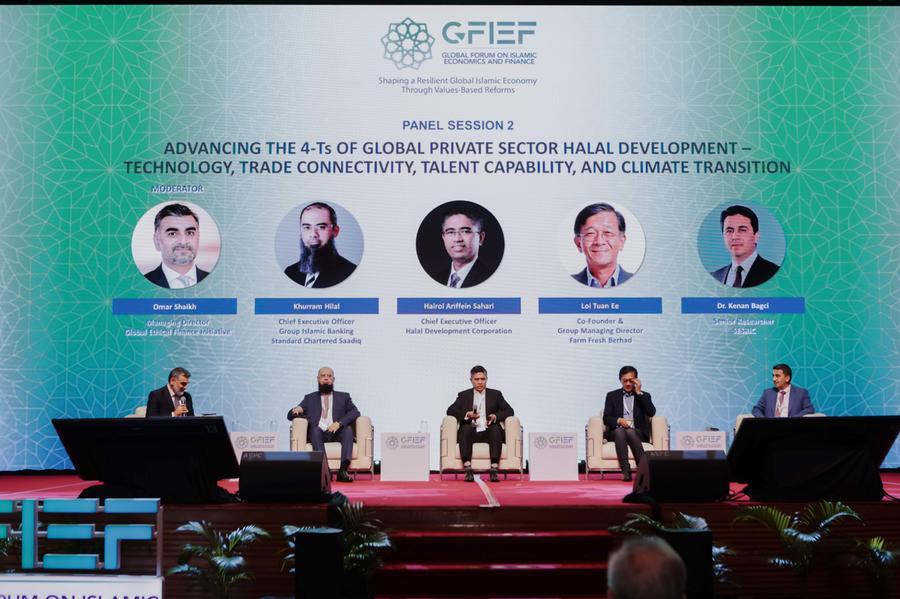
Kuala Lumpur, Malaysia: The Global Forum of Islamic Economics and Finance in Kuala Lumpur recently hosted a panel session exploring the economic, social and cultural impact of the halal industry. The session, titled “Advancing the 4Ts of Global Private Sector Halal Development – Technology, Trade Connectivity, Talent Capability, and Climate Transition,” aimed to delve into each of the 4Ts and examine their interplay, synergies, and transformative opportunities for private sector development on a global scale.
Khurram Hilal, CEO of Group Islamic Banking, Standard Chartered Saadiq, characterised the halal economy and Islamic finance as conjoined twins that have vast potential for holistic synergies, as they serve the same target market. As an example, he shared about Standard Chartered’s Halal 360 initiative, which supports halal businesses in various ways, such as providing export advisory services, facilitating skill development and accreditation process. Crucially, this initiative connected halal businesses with the Standard Chartered Network, enabling them to bring their products to the international market. He also proposed the idea of a grading system for halal products to help consumers make informed choices and promote end-to-end Shariah compliance within the industry.
There are still huge opportunities for growth in the halal economy, according to Hairol Ariffein Sahari, CEO of Halal Development Corporation (HDC), with around 200,000 companies in Malaysia involved in halal businesses, whilst less than 10,000 are certified halal. He saw the need to guide industry players on how to enter the halal economy. Recognising that there is a huge gap between supply and demand, he emphasised that HDC is prioritising collaboration over competition within the industry, whether through government-to-government (G2G) or business-to-business (B2B) cooperation measures.
From the perspective of the private sector entrepreneur, Loi Tuan Ee, Co-Founder and Group Managing Director of Farm Fresh Berhad, shared his company’s experiences in not just conducting halal business but also consciously utilising Islamic finance products and services to ensure Shariah compliance extends beyond the products to include the financing aspect. He emphasised the importance of talent capability, highlighting the need to infuse entrepreneurship and business acumen within the halal ecosystem. Loi also discussed the practical aspects of running a halal business, such as building ethical brand loyalty, developing marketable products and innovating with culturally appealing products to compete with larger multinational companies, such as dates-based milk for Muslims during Ramadan.
Underwhelmed by how the inter-Organisation of Islamic Cooperation (inter-OIC) trade has only increased by 10% in over 30 years, Dr. Kenan Bagci, Senior Researcher at SESRIC, highlighted the challenges faced by OIC countries in promoting private sector development and emphasised the importance of addressing capacity constraints whilst fostering dialogue between the halal and Islamic finance sectors. Dr. Bagci suggested creating halal industrial clusters at the sub-regional level, such as in Southeast Asia, to demonstrate successful experiences that can later be replicated in other regions.
The moderator Omar Shaikh, Managing Director of the Global Ethical Finance Initiative, added to Dr. Bagci’s points by highlighting the considerable size of the small and medium-sized enterprises (SME) sector and noting the comparatively limited Islamic financing channelled towards it. Observing the prominence of Islamic financial institutions in sukuk issuances over the past years, Khurram called on their responsibility to extend expertise in developing sustainable finance frameworks with the SME sector. This presents an opportunity for Islamic financial institutions to cater to SMEs’ needs in transitioning towards the halal economy.
A key theme emerging from the panel session was the need for greater awareness and collaboration between Islamic finance and the halal sector and the importance of addressing capacity constraints faced by OIC countries. By the end of the session, upon the insistence of the moderator Omar to choose one of the 4Ts to prioritise, most speakers agreed that talent development was the first and most important step to focus on in order to tackle the technology, trade and climate dimensions in the dynamically changing environment.
-Ends-
About GFIEF 2024:
The Global Forum on Islamic Economics and Finance (GFIEF) brings together over 2,300 policymakers, industry leaders and practitioners from 75 countries in Kuala Lumpur. Themed ‘Shaping a Resilient Global Islamic Economy Through Values-based Reforms’, the two-day forum aims to unlock the transformative power of Islamic economics and finance in fostering shared prosperity and equity. GFIEF features policy discourse and innovative solutions based on Islamic economics and finance principles to address the world’s challenges.
For more information, please visit kl.gfief.com.my
Media Contact:
Wai Fong TAN (Ms)
Media Co-ordinator
waifong@twfcomms.com









